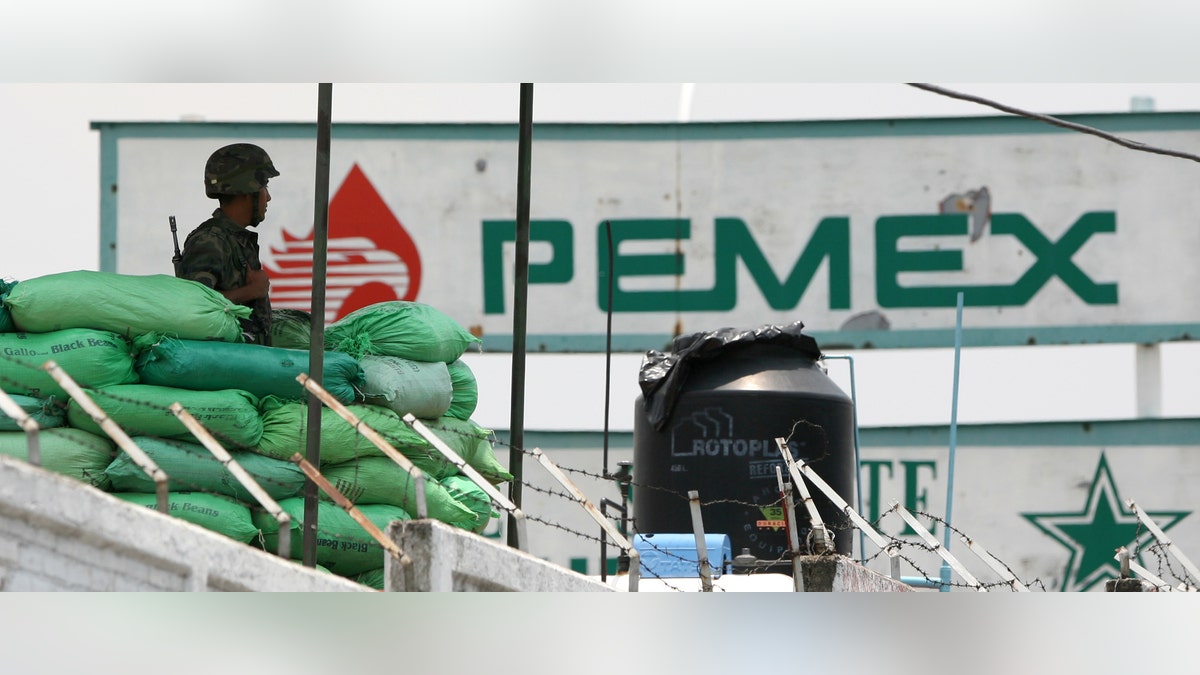
ARCHIVO - En esta foto de archivo del 11 de julio de 2007, un soldado del ejército mexicano monta guardia en una planta de la petrolera Pemex en la capital mexicana. El número de tomas ilegales en ductos de Petróleos Mexicanos se ha duplicado en lo que va de 2013, una de las pocas estadÃsticas relacionadas con delitos que, según el gobierno del presidente Enrique Peña Nieto, ha aumentado desde que asumió el cargo en diciembre pasado, dijo el gobierno el martes 23 de julio de 2013. (AP Foto/Eduardo Verdugo)
America’s oil companies are guardedly optimistic they will be the prime beneficiaries of the Mexican oil boom, just days after President Enrique Peña Nieto announced energy reforms opening Mexico’s state-owned oil and natural gas reserves to foreign investors for the first time in 75 years.
“There’s every reason for optimism, but we’d be wise to temper it,” Tony Garza, former U.S. ambassador to Mexico and now a lawyer with an office in Mexico City, told the Dallas Morning News in reference to the news of the potential privatization of PEMEX.
Garza echoed the concerns of others like Exxon Mobil CEO Rex Tillerson, who said that whether U.S. oil companies go into Mexico or not depends on the fine print.
“There will ultimately be participation. Whether it’s something we will do will depend on the terms and conditions,” he told the Morning News.
Under Peña Nieto’s privatization proposal this week, U.S. companies like Exxon and Chevron would benefit from new profit-sharing contracts and lifted restrictions, making it easier for energy companies to "book reserves" and raise financing.
Both major reforms, analysts said, make it more likely that U.S. oil companies will become the main beneficiaries of a new oil and gas boom south of the border.
The new profit-sharing scheme means state-owned oil monopoly Petroleos Mexicanos, commonly known as PEMEX, would continue to own the country’s oil reserves but would split profits with foreign investors, who in turn would help the government drill for oil and gas.
Mexico has lacked the technology and expertise to reach deep-water oil in the Gulf of Mexico and shale fields for natural gas, a skill the U.S. has already mastered.
PEMEX accounts for roughly a third of the government's revenue.
Perhaps even more important than profit-sharing contracts is the ability to “book reserves." According to Bloomberg news, Deputy Energy Minister Enrique Ochoa said Peña Nieto wants to allow multinational oil companies to register the value of their contracts with the U.S. Securities and Exchange Commission in terms of an estimated amount of oil they own the rights to, making it easier for companies to get financing from investors.
Though Mexico ranks third in oil reserve size in Latin America and ninth in worldwide production, and it remains third among sources of foreign supplying oil to the United States (after Canada and Saudi Arabia), the country has been experiencing an oil decline. Mexico’s oil experts to the U.S. have fallen to below the million-barrel-per day mark for the first time since 1994.
All told, as the New York Times reports, energy experts said privatization could lead to an increase in oil production by as much as 25 percent by 2024. Mexico could have 29 billion barrels of gas and oil reserved in the Gulf of Mexico and an additional 13 billion barrels of oil shale reserves.
Peña Nieto said reforms would allow Mexico to boost oil output from 2.2 to 3 million barrels a day by 2018, then up to 3.5 million by 2025. Gas production, he said, would also rise from 5.8 billion cubic feet today to 8 billion cubic feet by 2018 and 10.4 by 2025.
In the end, these constitutional reforms need to be enacted -- that may prove to be a more difficult task in the court of public opinion rather than in Mexico's congress.
Also playing a role in the mix is the fact that PEMEX is a symbol of Mexican nationalism -- a celebrated part of the national identity, pride and sovereignty since former President Lazaro Cardenas announced the nationalization of foreign oil companies in Mexico.
“For Mexicans, PEMEX is like the Virgin of Guadalupe — it has the magic of symbolism,” politica analyst Sergio Aguayo told the Washington Post. “It’s like apple pie for Americans.”
Follow us on twitter.com/foxnewslatino
Like us at facebook.com/foxnewslatino




















